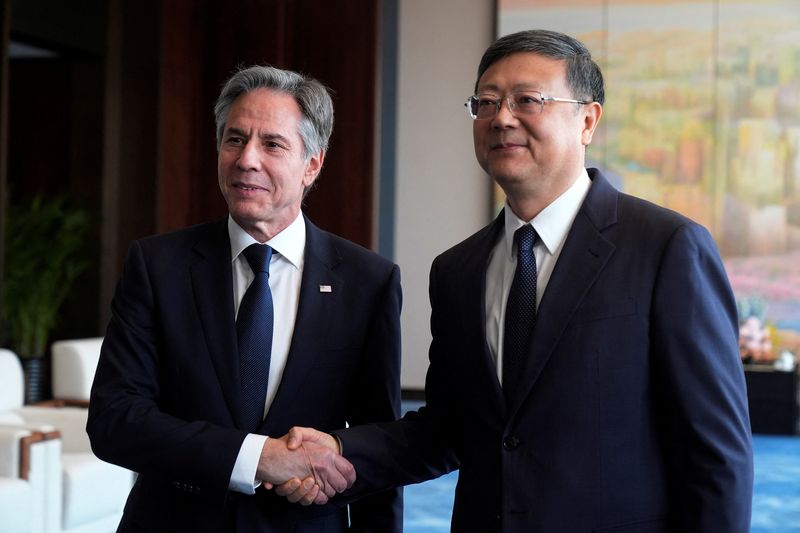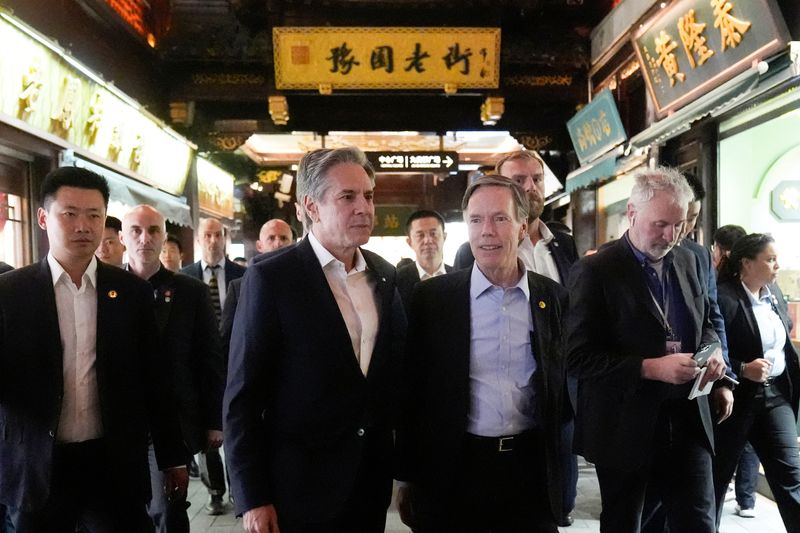By Simon Lewis
SHANGHAI (Reuters) -U.S. Secretary of State Antony Blinken on Thursday called on China to provide a level playing field for American businesses as he began a visit aimed at resolving a raft of contentious issues that could jeopardise the newly repaired relationship.
Blinken's trip is the latest high-level contact between the two nations that, along with working groups on issues from global trade to military communication, have tempered the public acrimony that drove relations to historic lows early last year.
But Washington and Beijing have been increasingly at odds over how American companies operate in China, Chinese exports and manufacturing capacity, and strains are also growing over Beijing's backing of Russia in its war in Ukraine.
State Department spokesperson Matthew Miller said that at a meeting with China's top official in Shanghai, Chen Jining, Blinken raised concerns about China's "trade policies and non-market economic practices."
Blinken also "stressed that the United States seeks a healthy economic competition with the PRC and a level playing field for U.S. workers and firms operating in China."
The PRC, or People's Republic of China, is the country's official name.
Responding to the comments later in the day, the spokesperson for the Ministry of Foreign Affairs, Wang Wenbin, told a regular media conference that "China has always been carrying out economic and trade cooperation in accordance with the principles of the market."
"We hope that the U.S. side will respect the principle of fair competition, abide by WTO rules and work with China to create favourable conditions for the sound and steady development of China-US economic and trade relations," said Wang.
While in Shanghai, Blinken also spoke with business leaders, as well as American and Chinese students at New York University's local campus, where he said intercultural interactions were "the best way to make sure that we start by hopefully understanding one another".
SUPPORT FOR RUSSIA
Blinken will head to Beijing on Friday for talks with his counterpart, Foreign Minister Wang Yi, and possibly President Xi Jinping. Those meetings could be fraught.
Just as Blinken landed in Shanghai, President Joe Biden signed a rare bipartisan bill that included $8 billion to counter China's military might, as well as billions in defence aid for Taiwan and $61 billion in aid to Ukraine.
Biden also signed a separate bill tied to the aid legislation that bans TikTok in the U.S. if its owner, the Chinese tech firm ByteDance, fails to divest the popular short video app over the next nine months to a year.
Blinken will press China to stop its firms from retooling and resupplying Russia's defence industrial base. Moscow invaded Ukraine days after agreeing a "no limits" partnership with Beijing, and while China has steered clear of providing arms, U.S. officials warn Chinese companies are sending dual-use technology that helps Russia's war effort.
Without providing details, a senior State Department official told reporters that Washington was prepared to "take steps" against Chinese firms it believes are damaging U.S. and European security.
State-run China Daily said in an editorial that there was "a huge question mark over what the discussions between Blinken and his hosts can yield" and that both sides "have been largely talking past each other."

"On the conflict in Ukraine, the world can see it clearly that the Ukraine issue is not an issue between China and the U.S., and the U.S. side should not turn it into one," it said.
Other state media also highlighted the tensions over the differences. "Plenty of animosity remains, primarily fuelled by Washington's adherence to a zero-sum mindset and framing China as a threat," a commentary in state-run Xinhua news agency said.
